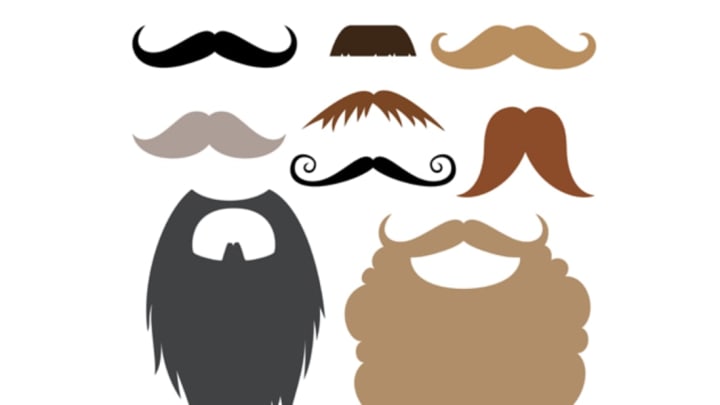It’s Movember, the month when normally naked upper lips get covered with mustaches that range from pleasant to preposterous. For many, it’s unnecessary to grow a 'stache, since the beard is a popular (non?)grooming choice, and few beards are unaccompanied by a sweet 'stache. In recognition of seasonal and year-long fascination with facial hair, here are some older terms for the non-clean-shaven.
1. AND 2. BARBATULOUS AND BEARDLET
The very rare term barbatulous—a relative of barber—sounds like variation of barbarous, but it describes a quality that, traditionally, would not fit the barbarian lifestyle: having a teeny-weeny beard. This term dates from at least 1600, and since the early 1990s, beardolosists have called such itty-bitty growths beardlets. Oxford English Dictionary examples of the term in use are fairly hilarious, including a 1928 example from the Daily Express describing “The beardlet adorning the under-lip of Lord Bertie of Thame.”
3. IMBERBIC
If you’re imberbic, you don’t even have a beardlet. You’re totally beardless, you naked-faced monster. This extremely obscure word popped up in the early 1600s.
4. CAT-SMELLERS
Since cats use their whiskers to whiff, some have taken to calling whiskers, especially a stache, cat-smellers. This term popped up in the mid-1800s and deserves a revival.
5. TAZ
Though this term brings to mind unholy beasts such as the Tasmanian devil, it’s only a variation of some more common words: tash and stache, which have long been abbreviations of mustache. As Green’s Dictionary of Slang (GDoS) shows, taz is versatile enough to not only mean a mustache, as it’s sometimes referred to a beard or the peach fuzz of a whippersnapper.
6., 7., 8., AND 9. FACE FUNGUS, FACE LACE, FACE FUR, AND FACE PRICKLE
Facial hair has rarely been in vogue as it is now, and that lack of vogueness can be seen in insults such as face fungus, which have been spotted since the early 1900s. If using this term for someone’s beard and/or mustache isn’t enough, you can also use it as a nickname and/or insult, such as, “Hey! Face fungus!” Far more gentle and complimentary terms include face lace, face fur, and face prickle.
10. FACE FINS
Here’s a mustache-centric term along the same lines. First spotted in the 1980s, this term implies a protruding, monstrous stache more likely to be seen on a contemporary hipster or 1920s movie villain. Fellows with face fins take the mustache to its most extravagant extreme.
11. TOPIARIZE
Related to the word topiary, this recent but still under-the-radar word refers to trimming a beard and/or mustache in a manner that could be considered artsy-fartsy or fancy-shmancy. Paul McFedries’s wonderful Word Spy site records the first use in a 1993 article in The Independent that describes Sean Connery: “… his beard topiarised to a silvery point, bonds Bondishly with Snipes—gunpowder-dry gags and plenty of oneupmanship—but they never quite spark, leaving the film’s Eastern promise unfulfilled.” McFedries also documents a wonderful variation by Douglas Walker in 2015 on Twitter: “Auto-topiarising your beard is difficult for the partially sighted man.”
12. BEARDIE WEIRDIE
This disturbingly rhyming term has been around since the 1960s, according to GDoS. It originally referred to a fellow looked upon as a bookish egghead or radical rabble-rouser.
13. JUST AS I FEARED
Jonathan Green suggests this example of rhyming slang may have spawned from an 1846 Edward Lear limerick, which goes like so: "There was an old man with a beard / Who said ‘It is just as I feared!’ Two owls and a hen / Four larks and a wren / Have all built their nests in my beard.” Hate when that happens.
14. AND 15. POGONOTOMY AND POGONOTROPHY
These terms are blends of Greek and English, and despite the fancy sound, they have dirt-simple meanings. Pogonotomy simply refers to shaving, while pogonotrophy is the opposite: allowing a beard to flourish on the facial stage. A 1996 use from the Daily Mail shows how fickle the public can be when judging face fuzz: “This week's picture of Beatle George Harrison wearing a moustache—and a particularly sad, droopy looking one at that—caught students of pogonotrophy the world over in two minds.”
